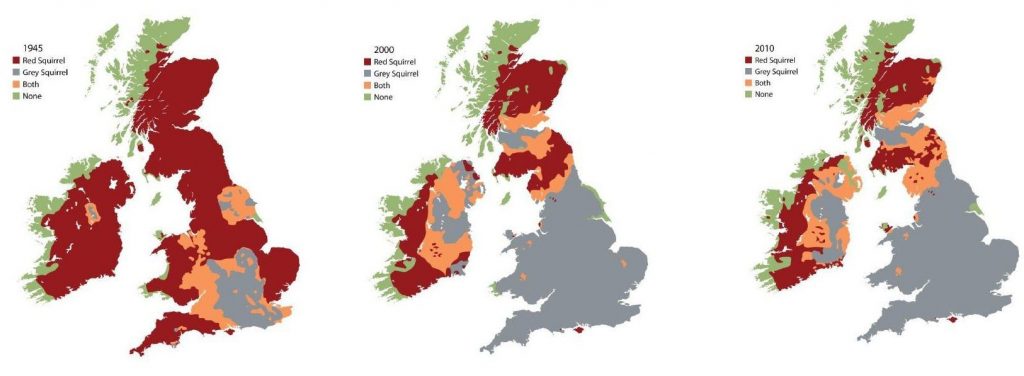Grey squirrels (Sciurus carolinensis) are a non-native invasive species that were introduced to the UK in the late 19th century from North America.
Since their introduction, the grey squirrels have spread prolifically around the UK having a devastating impact on not only the native red squirrel (Sciurus vulgaris), but the ecosystems that evolved over the centuries without their presence.
Squirrel Distributions Maps 1945 – 2010

The Virus
When the non-native grey squirrels were shipped over to the UK in the 1800’s, unbeknown to the Victorians the grey squirrels were carrying a virus called SQPV (commonly known as the Squirrel Pox Virus).
The grey squirrels released in to the English countryside multiplied and in doing so spread the virus to our native red squirrels who had never been exposed to it.
To this day if SQPV is contracted, it remains fatal to red squirrels.

Woodland Damage & Competition
Grey squirrels are prolific and have had huge impact in our woodland ecosystems. It is estimated that in England and Wales alone, over £37 million a year worth of timber is damaged and lost to grey squirrels who gnaw on the bark that can cause significant damage to the tree.
Deforestation is also a factor in condensing an ever growing population of non-native greys into smaller woodland ecosystems struggling to provide for our native red species. The non-native grey squirrels are bigger and stronger than the native red squirrel and can therefore out compete red squirrels for natural food. This can spell disaster for red squirrels if by winter they have not ‘cached’ (buried) enough to get through the harsh season ultimately leading to starvation (if the SQPV hasn’t got them already).
Grey squirrels also predate other native woodland inhabitants such as song birds, their eggs and chicks as well as dormice and other small woodland mammals.
Turning the tide from Conservation Now on Vimeo.
A big thank you to Red Squirrels South West for the use of their ‘Turning the tide’ film.
Grey Squirrel Management
Without the actions taken by all the various groups and organisations involved with red squirrel conservation over the last few decades, our native red squirrel would all but have disappeared from our shores.
It is down to all the hard work and dedication by the local people, landowners, volunteers and our rangers that the non-native grey squirrels are held back and removed from our woodlands.
This control of the invasive grey squirrel allows the red squirrel (and other woodland wildlife!) to exist and in areas, thrive here in Cumbria and elsewhere.
